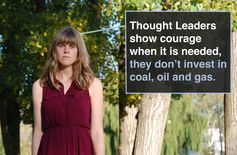The Paris climate agreement has been praised for sending a strong signal to the world that we are now serious about cutting greenhouse emissions.
Yet despite the diplomatic acclaim, the Paris deal doesn’t offer much in concrete terms. It is a simple global show-and-tell regime with no enforcement – if countries miss their targets they will receive little more than a talking-to.
For many, the deal’s saving grace is the message it sends to investors, businesses and the wider world outside diplomatic and political circles. The Economist has summed up this “investment signal†idea well:
Perhaps the most significant effect of the Paris agreement in the next few years will be the signal it sends to investors… [After Paris] the idea of investing in a coal mine will seem more risky.
The problem is that there is little to no empirical evidence to support this idea. Will hard-nosed financiers change their ways purely on the basis of long-term pledges that are not supported by short-term actions? Will they redirect vast sums of money because of faith in a loose international treaty? In all honesty, we don’t know.
There are clues, however, if we know where to look. If we want to see whether the investment signal from Paris is working, then universities will probably be – for want of a better phrase – the canary in the financial coalmine.
If Paris has truly signalled to the world that the age of fossil fuels is coming to a close, then it should put the movement to divest from fossil fuels on steroids.
And universities are better placed to divest than many other types of institution. It therefore follows that the success of Paris can be measured by whether it spurs universities to quit investing in fossil fuels.
Going fossil-free
Fossil fuel divestment is spreading across the world. According to the campaign group Fossil Free, at least 518 institutions, collectively worth US$3.4 trillion, are either fully or partially divesting.
The list includes groups such as the Rockefeller Brothers Fund, local governments such as the Australian Capital Territory and the cities of Oslo and Copenhagen, among many others.
Meanwhile universities, which currently make up 12% of this list, have become a particular target for the divestment movement. This is because they are forward-looking institutions with progressive, well-educated stakeholders. After all, it was university faculty members across the world who helped to set out the problem of climate change, and young students who will be among the generations most affected by its future impacts.
Just as universities were among the first movers against apartheid, they can set an example to others in the case of climate. Universities, many of which manage multi-billion-dollar endowments, have both the ability and responsibility to exercise financial power and act early on long-term moral problems.
If the Paris investment signal exists, then, we can expect universities to act well in advance of those with much greater inertia and vested interests in the status quo, such as profit-making corporations (which make up just 3% of Fossil Free’s divestment list).
Mixed results
So far the response from universities has been patchy, particularly in Australia. The Australian National University (ANU) provides an informative case study. It shows both the potential of divestment and the limits of the Paris market signal.
In 2014, ANU blacklisted seven resource companies (including two fossil fuel firms, Santos and Oil Search) on the basis of its “socially responsible investment†policy. This triggered a backlash from the likes of the then treasurer, Joe Hockey, and prime minister, Tony Abbott, as well as sustained criticism from the Australian Financial Review.
The outcry showed the power that universities can wield in the climate debate when they put their money where their mouth is. In this case it was a positive impact as it triggered a wider debate on climate policy and investments.
Last month, the ANU updated its policy, announcing a 39% reduction in the carbon intensity of its stock portfolio and pledging to divest from companies that draw more than 20% of their revenue from coal.
However, the policy allows for continued investment in diversified mining companies such as Woodside Petroleum, Rio Tinto and BHP Billiton. This potentially includes firms with significant fossil fuel holdings (BHP Billiton Mitsubishi Alliance is the largest Australian coal producer, accounting for a quarter of Australian coal exports).
This is partial, not full, divestment – it’s a positive step, but far from the seismic investment shift needed to meet the Paris climate goals.
Importantly, the trigger for change has come from within, rather than from Paris. There has been overwhelming pressure from staff and students to divest fully. Yet the university has resisted these calls. Indeed, ANU Vice-Chancellor Brian Schmidt last month tweeted that while the “future lies in being part of the transition to low emissions”, fossils fuels are “good business for universities†for the time being at least.
Future lies in being part of the transition to low emissions-Fossil fuels are good business for universitieshttp://www.smh.com.au/comment/fossil-fuels-are-good-business-for-universities-20160428-gogz13.html … @smh
Fossil fuels are good business for universities
Universities divesting from fossil fuels is bad for students.
smh.com.au
There are several counterarguments to this , from the falling costs of renewable energy, to the improving performance of fossil-free investment funds, which often outstrip more conventional ones. But on a basic level it comes down to leadership.

The ANU has branded itself as a place of “thought leadershipâ€Â. Its current actions show neither long-term thought nor leadership. True leadership would mean showing real belief in the implications of the Paris Agreement.
Widespread, full university divestment from fossil fuels would further pressure national governments to strengthen their commitments – which will be crucial if the Paris Agreement is to meet its goals.
In contrast, continued investment in fossil fuels weakens such pressure and bolsters a belief in the continued relevance of the fossil fuel industry in a post-Paris world.
Universities such as the ANU have not responded swiftly enough to Paris and the signalling of the end of the fossil fuel era. If thought leaders won’t do it, how can we ask the same of governments and banks?









